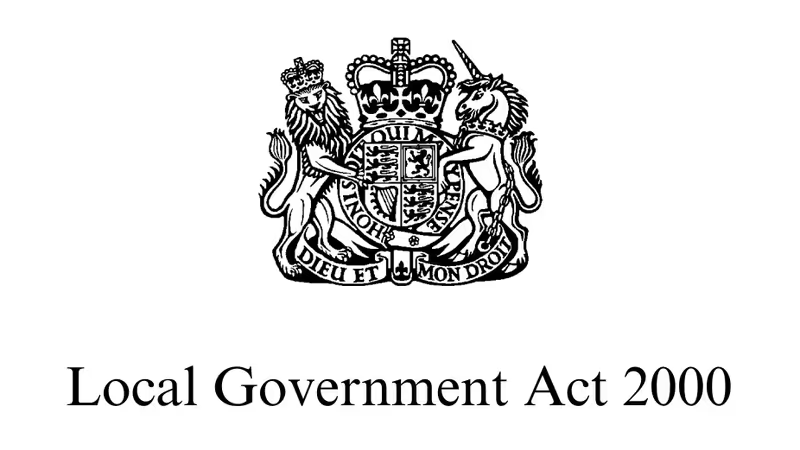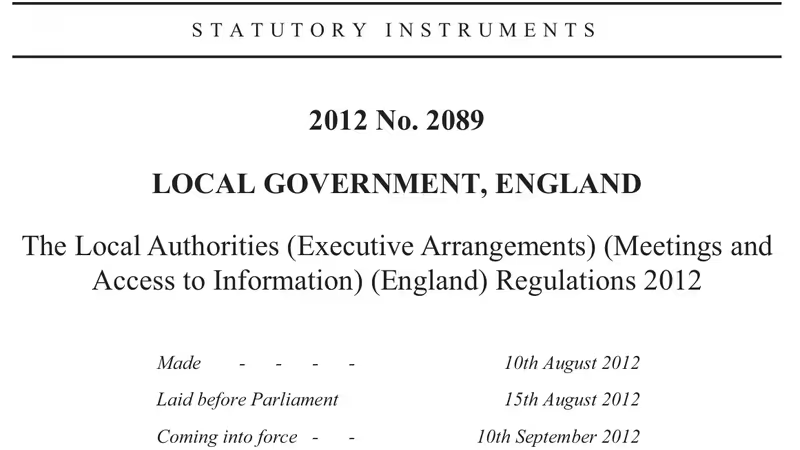Exeter City Council’s Executive committee had twenty items on its agenda when it last met a fortnight ago but, according to the council, it only actually took one decision.
Decisions on another thirteen items of Executive business are instead to be taken this evening by a meeting of all the councillors elected to represent the city’s residents, the “full council”.
However, according to the legislation that underpins the way the council performs its functions, several of these decisions should have been taken by the Executive instead.
At other meetings the Executive should be taking most decisions but takes none at all.
And the council is inconsistent about decision-making. Last month the Executive decided to increase council housing rents by the maximum allowed by law, but last year’s decision to do the same thing was taken by the full council instead.
It’s hardly surprising that councillors are confused about the rules. When presenting his proposals for a council lottery at the end of last year, Labour councillor Martin Pearce claimed that the Executive, of which he is a member, doesn’t take decisions.
He said debate about his proposals should take place at full council, which would decide whether to adopt them, despite the legislation saying this decision should have been taken by the Executive.
He also proposed the council’s latest homelessness strategy to the Executive a fortnight ago, although tonight’s full council meeting will approve it, again despite the legislation.
And while he changed the council’s constitution to allow opposition leaders to ask questions at Executive committee meetings, council leader Phil Bialyk no longer answers them there, instead providing written replies long after debate has concluded.
Green party councillor Diana Moore asked several questions at last month’s Executive meeting seeking more clarity on tonight’s budget proposals, but the responses took five weeks to appear and failed to answer most of her questions when they did.
How have things come to this?
The council governance reforms introduced by the 2000 Local Government Act explicitly intended to separate policy-making, decision-making and scrutiny with the aim of delivering “greater efficiency, transparency and accountability”.
The new Executive arrangements Exeter City Council adopted following the Act meant that, from then on, occasional full council meetings would approve overarching policy frameworks and budgets proposed by an executive committee, which would also implement them.
This Executive, of nine councillors including a leader, would be chosen each year by council members and be collectively responsible for discharging its duties.
Accompanying regulations detailed what local authority executives could do, what they could not do, and what they could only do in conjunction with the full council.
In 2007 the Labour government decided that these arrangements hampered decision-making because council leaders were not able to act alone in choosing executive members and might find it difficult to push through unpopular decisions.
After the Conservative-led coalition took over in 2010 it followed through, requiring all local authorities to change their Executive arrangements by no later than May the following year.
 Exeter Guildhall - centre of the city’s civic government for 600 years
Exeter Guildhall - centre of the city’s civic government for 600 years
Exeter City Council duly decided in December 2010 to adopt a new setup known as “strong leader” arrangements in which councillors elect a leader for a four-year term who then appoints Executive members on an annual basis.
The revised Executive arrangements were agreed the following April, took effect in May 2011 and have remained in force ever since.
A 2019 council guide called “how decisions are made” says “the Executive is responsible for the most significant and day to day decisions which are not delegated to officers”.
And the section of the council’s constitution which sets out the full council’s functions confirms that it should only take decisions which are properly the responsibility of the Executive if the Executive overreaches its powers by deciding something that would be “contrary to the policy framework or contrary to or not wholly in accordance with the budget” it has agreed.
In other words, while the full council is there to safeguard against the Executive (or council leader) running amok, the Executive should be the council’s principal decision-maker (with many of its functions delegated to council officers or sub-committees) unless things go wrong.
So once the budget and policy framework is in place, meetings of the full council are there largely to ensure that the Executive (or council leader) stays within their bounds.
The key word, as in the legislation, is “contrary”. Full council meetings are not there to make minor budget alterations or variations to existing policies, and are certainly not there to take decisions which do not affect the budget or policy framework at all.
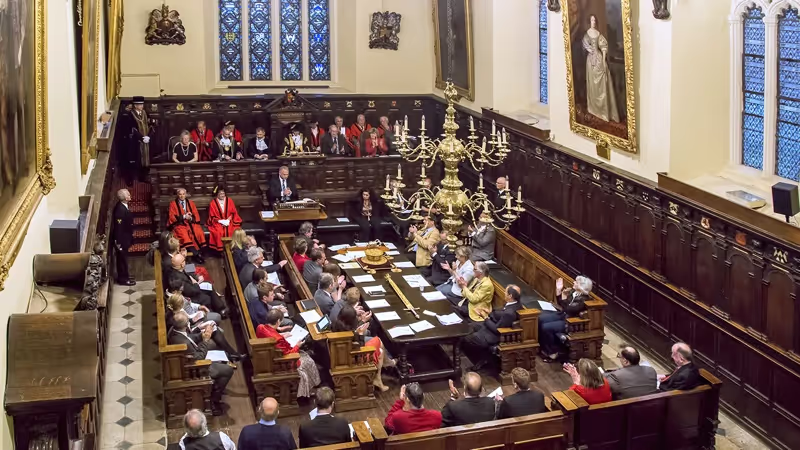 Exeter City Council in session at Exeter Guildhall. Photo: © Sandra Barrett, All Rights Reserved.
Exeter City Council in session at Exeter Guildhall. Photo: © Sandra Barrett, All Rights Reserved.
However instead of Exeter City Council’s Executive performing its functions as intended, most of the decisions it should take are instead taken at full council meetings.
The Executive even submits reports that do not require any decision at all for full council approval. One such report is going to this evening’s meeting despite the programme it relates to already having been approved this time last year.
The contrast between the way Devon County Council and Exeter City Council decide things, despite both having adopted Executive arrangements under the same legislation, is striking.
The county council’s February forward plan identifies sixteen decisions it expects to take over the next three months of which only two will require full council approval. The other fourteen will be taken by the county council’s cabinet, the equivalent of the city council’s executive.
These include the adoption of a wide range of plans and strategies as well as the approval of various capital budgets and infrastructure scheme proposals. County council financial reporting and monitoring is all also dealt with by its cabinet.
The city council does things the other way round. Its February forward plan lists 29 decisions to be taken over the next three months of which 22 are to be taken at full council meetings.
Among these is the curiously-titled “Report of the Plant Based Task and Finish Group”. Should we expect its conclusions to be contrary to the council’s existing budget or policy framework?
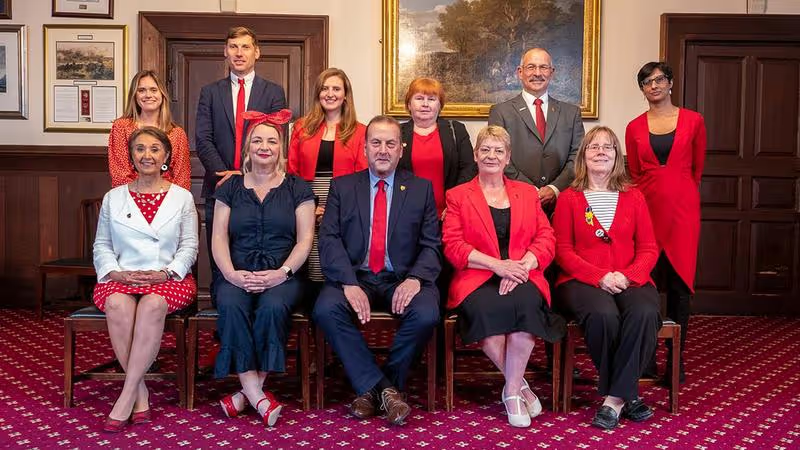 Exeter City Council 2022-23 executive portfolio holders and non-executive member champions (top left to right): Naima Allock, Martin Pearce, Josie Parkhouse, Barbara Denning, Duncan Wood, Zion Lights, Amal Ghusain, Emma Morse, Phil Bialyk, Laura Wright, Ruth Williams.
Exeter City Council 2022-23 executive portfolio holders and non-executive member champions (top left to right): Naima Allock, Martin Pearce, Josie Parkhouse, Barbara Denning, Duncan Wood, Zion Lights, Amal Ghusain, Emma Morse, Phil Bialyk, Laura Wright, Ruth Williams.
The council Executive does occasionally take key decisions, those which are likely to result in significant expenditure (or savings) against council-set budgets or significant impact in more than one electoral ward. It sets its budgetary significance threshold at £1 million, although many other councils set theirs at £100,000.
But it appears to think that other decisions that are in line with the council’s policy framework and budget (leaving aside matters such as planning, licensing and audit that are dealt with by specific committees) cannot be Executive decisions so must be taken at full council meetings.
Three years ago a Court of Appeal ruling concerning a council cabinet’s decision to adopt a ten-year sports strategy gave what was described as “valuable guidance to local authorities on the division of functions between full council and cabinet”.
The judgement confirmed that all functions of local authorities (that have adopted Executive arrangements) should be exercised by their executives unless overreaching their powers, and that the scope for what constitutes overreach should be “fairly narrow”.
It said it should not simply apply to “any strategy” that “is likely to have implications for future expenditure in the event that it is implemented”, adding: “A decision which is merely likely (or even very likely) to lead to a future decision involving such expenditure [of money not provided for in the budget or capital expenditure plan] will remain the responsibility of the executive.”
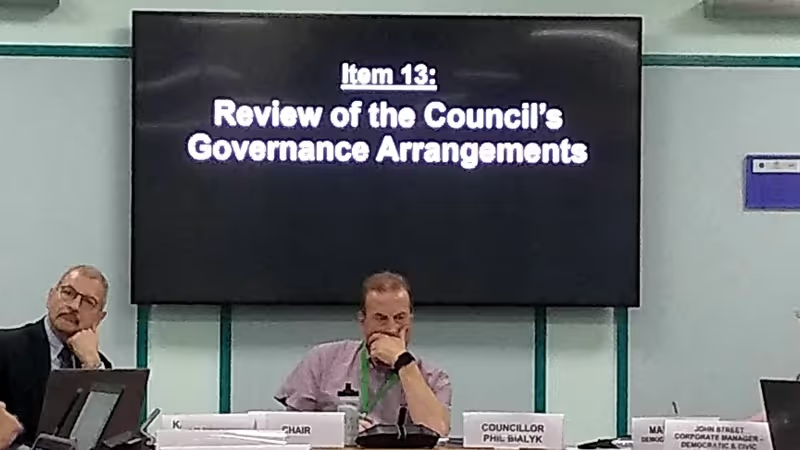 Council leader Phil Bialyk and CEO Karime Hassan contemplate cuts to Executive decision-making scrutiny in October 2019
Council leader Phil Bialyk and CEO Karime Hassan contemplate cuts to Executive decision-making scrutiny in October 2019
Notwithstanding the legislation, Exeter City Council’s approach to decision-making might at first appear more democratic, tasking full council meetings with taking all but a small subset of decisions.
But apart from the risks of taking potentially unlawful decisions, its approach also has the effect of frustrating the principles at the heart of the 2000 Local Government Act reforms, more recently reasserted in the 2011 Localism Act.
One was that policy-making, performed at full council meetings, should be separated from (most) decision-making, performed by the Executive.
Another was that a second safeguard against Executive (or council leader) overreach should be provided by scrutiny committees on which Executive members are not allowed to sit.
To enable backbench councillors that sit on these committees to hold Executives to account they are afforded legal powers to “call in” executive decisions, delaying their implementation so they can be subjected to greater scrutiny, reconsidered and potentially overturned.
They also have enhanced powers to access confidential information, can investigate any issue which affects “the area or the area’s inhabitants” and can call councillors, council officers and representatives of external bodies to attend and give evidence, like parliamentary select committees.
As statutory government guidance says, “the role that overview and scrutiny can play in holding an authority’s decision-makers to account makes it fundamentally important to the successful functioning of local democracy”.
But not at Exeter City Council, because scrutiny powers only have teeth when Executive functions are being discharged. When most decisions are made at full council meetings scrutiny can no longer provide the “check and balance on the executive” that is intended.
And there is another anti-democratic consequence of choosing to take what should be Executive decisions at full council meetings.
Doing so emboldens the council to claim that rules about public access to executive meetings and documents that became law in 2012, replacing outmoded regulations which had accompanied the 2000 Local Government Act, simply don’t apply.
These require local authorities (that have adopted Executive arrangements) to publish at least 28 clear days’ notice of their intention to hold any part of an executive meeting in private, and provide for the public to make representations about why the meeting should instead be open.
The government said it introduced the new rules because the previous regulations “resulted in more meetings being held in private than could be properly justified”.
It added that the new regulations “materially strengthen transparency and openness, by providing a clear presumption that all meetings of the executives, their committees or sub committees, must be held in public except in limited prescribed circumstances”.
Three items were heard in private at this month’s Executive meeting, one of which concerned cuts to senior council management. Only 21 days’ notice was given of the intention to hear it in private, so we made a representation that the notice required by law had not been provided.
The council’s response was that the legislation does not apply because the item in question was not an Executive decision.
Bizarrely, it then said it had fulfilled its obligations under the legislation it said does not apply by including our representation and its response on the meeting agenda.
Another item concerning cuts at RAMM was also supposed to be heard in private at the meeting, about which it said the same thing, but by the time the meeting came there was no sign of it on the agenda at all.
If the council’s claim that these rules only apply when Executive decisions are being made was true, it would be free to conduct most Executive business as it pleases.
However the 2012 regulations apply not only because its Executive should be taking decisions on most of the business that comes before it, but because these rules apply to Executive meetings in any case, as the legislation makes clear.
Access to council executive meetings and documents
From Open and accountable local government - Plain English Guide, Department of Communities and Local Government, August 2014:
A council’s executive (i.e. the council’s cabinet) is its main decision making body consisting of an elected mayor or leader and a number of councillors.
What are the national rules for access to meetings and documents of a council’s executive?
The national rules are principally provided by the Local Authorities (Executive Arrangements) (Meetings and Access to Information) (England) Regulations 2012 which introduced significantly greater transparency and openness into the meetings of a council’s executive, its committees and sub-committees.
How will I know about a private meeting of my council’s executive?
Prior to holding a private meeting, your council must have published on its website and at its offices at least 28 clear days’ notice of its intention to consider a matter in private and the reasons for the private meeting.
Can a private meeting of my council’s executive be held if 28 days’ notice is not given to the public?
A private meeting can only be held without 28 days’ notice after the agreement of the Chairman of the overview and scrutiny committee has been obtained that the meeting is urgent and cannot reasonably be delayed.
If agreement is not given then the meeting must either be held in public, or the council must comply with the 28 day notice requirements.
So we have legislation which enables council leaders to dominate their Executives, because their four-year terms and annual appointment powers combine to disincentivise dissent, and Executives which are supposed to take (or delegate) most council decisions.
Both are to be held to account by the full council, but only if the Executive overreaches its powers, and by scrutiny committees the rest of the time.
However at Exeter City Council we have an Executive which takes very few decisions, bypassing the checks and balances scrutiny is supposed to provide, and full council meetings in which councillors from the council leader’s party votes in favour of anything he tells them to.
He even takes it upon himself to stand up in meetings to remind them which way to vote.
It is clearly in his interest to send so many Executive decisions for full council approval, although it is an open question whether this would continue were his party’s majority to crumble.
But doing so is not in the interests of Exeter’s residents and businesses, who have to live with the consequences of council decision-making.
Last year we examined council decisions to allocate £55 million to buy and redevelop the Guildhall shopping centre, and to send its chief executive and another senior director to work for Exeter City Futures while continuing to draw their council salaries.
We also looked at the decisions the council made regarding Exeter City Living between the company’s formation in August 2018 and March 2022, including decisions to loan the company millions of pounds of public money and sell it council land for development.
Most were made in ways that appeared to breach local government legislation and evade scrutiny intended to protect the public interest in the council’s use of resources.
By the end of March last year Exeter City Living had lost £3.3 million after posting income of just £36,000 for 2021-22 against expenditure of £3.2 million.
By the end of December two senior council directors had resigned from its board because of conflicts of interest, its managing director had been replaced and the departure of the council chief executive, Karime Hassan, who was the council’s shareholder representative at the company, had been announced.
At the same time the dissolution of Exeter City Futures was being discussed, with an announcement in prospect in the next few months.
Since then, despite an external auditor’s report criticising the council for taking decisions related to Exeter City Living in private and withholding company business plans and reports from the public, and the council agreeing to change its ways, it has become clear that it does not intend to honour its commitments.
We have raised these issues with council officers repeatedly. We were told in December 2021 that Baan Al-Khafaji, the council’s monitoring officer who is responsible for ensuring it complies with the law, and who oversaw the introduction of the current Executive arrangements in 2010, would respond. We never heard from her.
